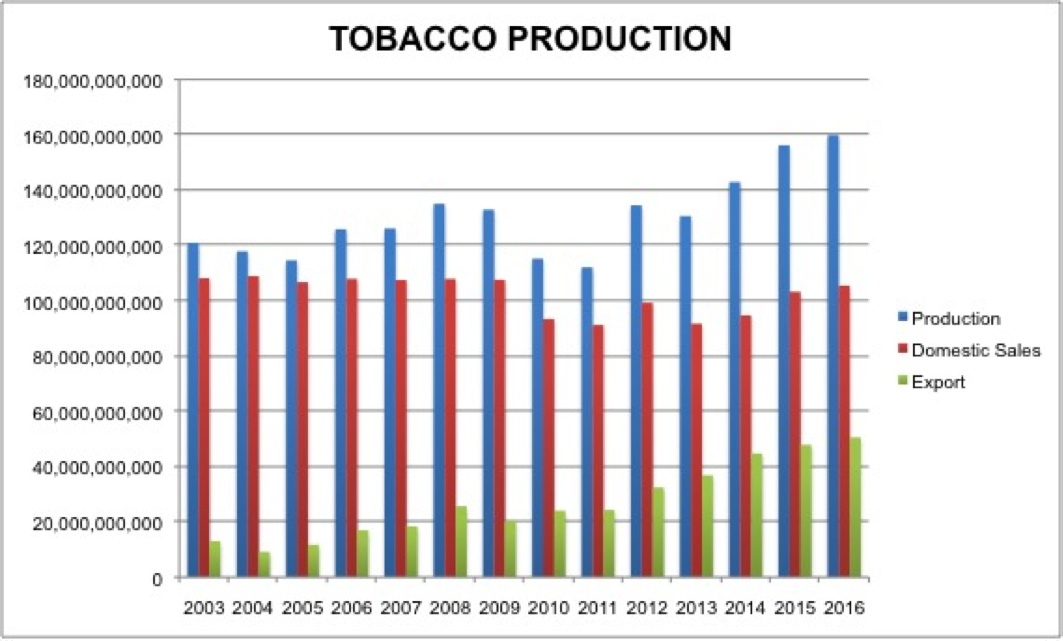Recent manuscripts
Archive
Editorial Board
Aims and Scope
Open Access
Indexing
Contact us
Authorship & COI
Principles of Transparency Checklist
Publication Ethics
Crossmark
Data Policies
Instructions to authors (PDF)
Manuscript Types
Manuscript Formatting
How to submit
Special Publications & Reprints
Preprints
Measuring sustainability of tobacco control by market and consumption data in Turkey
1
Health Institute Association, Turkey
Publication date: 2018-03-01
Tob. Induc. Dis. 2018;16(Suppl 1):A592
KEYWORDS
TOPICS
ABSTRACT
Background:
Turkey has been recognized as a leader in tobacco control, implementing all MPOWER policies. However, reports have indicated challenges in the sustainability of the success. This study aims to investigate the change in dynamics of tobacco manufacturing, marketing and consumption in the country as a measure of efficacy in policy implementation.
Methods:
The data were obtained from Surveys of Turkish Statistics Institute and Tobacco and Alcohol Regulatory Authority, Global Tobacco Adult and Youth Surveys, Euromonitor reports.
Results:
Turkish tobacco market is controlled by 5 transnational companies. Tobacco production increased by 40% between 2011-2016 in contrast to the reduction of 23 % in 2008-2011 period. Non-cigarette tobacco product manufacturing has increased by 82 % in the last decade. Tobacco production per capita increased from 1.11 kg in 2011, to 1.46 kg in 2016. Annual domestic cigarette sales of 91 billion sticks in 2011 soared up to 105 billion sticks in 2016. Cigarette exportation increased by 290 % between 2003-2016, while tobacco industry revenue due to domestic cigarette sales and exporation increased by 354%and 244% respectively. Between 2010-2015 increase in cigarette sales were reported as 12% in volume and 85% in revenue. The number of smokers reached to 15.7 million in 2015. By 2016 40 % of men and %13 women were smoking cigarettes (in total 26.5%). Current smokers in 13-15 age group increased from 6.9 % in 2003 to 8.4% in 2009 and to 10.4 % in 2012. Tobacco related mortality was unchanged between 2011-2015, 124.8/100.00 and 123.7/100.000 respectively.

[Tobacco production in Turkey]
Conclusions:
Starting from 2011 tobacco control has shown a downhill trend in Turkey, all gained seems to be lost by 2016. The reasons for this change must be investigated in order to restore sucess not only for Turkey but for all the countries which may follow the same path.
Turkey has been recognized as a leader in tobacco control, implementing all MPOWER policies. However, reports have indicated challenges in the sustainability of the success. This study aims to investigate the change in dynamics of tobacco manufacturing, marketing and consumption in the country as a measure of efficacy in policy implementation.
Methods:
The data were obtained from Surveys of Turkish Statistics Institute and Tobacco and Alcohol Regulatory Authority, Global Tobacco Adult and Youth Surveys, Euromonitor reports.
Results:
Turkish tobacco market is controlled by 5 transnational companies. Tobacco production increased by 40% between 2011-2016 in contrast to the reduction of 23 % in 2008-2011 period. Non-cigarette tobacco product manufacturing has increased by 82 % in the last decade. Tobacco production per capita increased from 1.11 kg in 2011, to 1.46 kg in 2016. Annual domestic cigarette sales of 91 billion sticks in 2011 soared up to 105 billion sticks in 2016. Cigarette exportation increased by 290 % between 2003-2016, while tobacco industry revenue due to domestic cigarette sales and exporation increased by 354%and 244% respectively. Between 2010-2015 increase in cigarette sales were reported as 12% in volume and 85% in revenue. The number of smokers reached to 15.7 million in 2015. By 2016 40 % of men and %13 women were smoking cigarettes (in total 26.5%). Current smokers in 13-15 age group increased from 6.9 % in 2003 to 8.4% in 2009 and to 10.4 % in 2012. Tobacco related mortality was unchanged between 2011-2015, 124.8/100.00 and 123.7/100.000 respectively.

[Tobacco production in Turkey]
Conclusions:
Starting from 2011 tobacco control has shown a downhill trend in Turkey, all gained seems to be lost by 2016. The reasons for this change must be investigated in order to restore sucess not only for Turkey but for all the countries which may follow the same path.
Share
RELATED ARTICLE
We process personal data collected when visiting the website. The function of obtaining information about users and their behavior is carried out by voluntarily entered information in forms and saving cookies in end devices. Data, including cookies, are used to provide services, improve the user experience and to analyze the traffic in accordance with the Privacy policy. Data are also collected and processed by Google Analytics tool (more).
You can change cookies settings in your browser. Restricted use of cookies in the browser configuration may affect some functionalities of the website.
You can change cookies settings in your browser. Restricted use of cookies in the browser configuration may affect some functionalities of the website.

